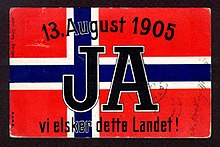This article needs additional citations for verification. (June 2018) |

The dissolution of the union (Bokmål: unionsoppløsningen; Nynorsk: unionsoppløysinga; Landsmål: unionsuppløysingi; Swedish: unionsupplösningen) between the kingdoms of Norway and Sweden under the House of Bernadotte, was set in motion by a resolution of the Storting on 7 June 1905. Following some months of tension and fear of an outbreak of war between the neighbouring kingdoms (then in personal union) – and a Norwegian plebiscite held on 13 August which overwhelmingly backed dissolution – negotiations between the two governments led to Sweden's recognition of Norway as an independent constitutional monarchy on 26 October 1905. On that date, King Oscar II renounced his claim to the Norwegian throne, effectively dissolving the United Kingdoms of Sweden and Norway, and this event was swiftly followed, on 18 November, by the accession to the Norwegian throne of Prince Carl of Denmark, taking the name of Haakon VII.